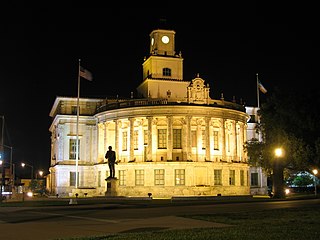
Coral Gables, officially the City of Coral Gables, is a city in Miami-Dade County, Florida, United States, located 7 miles (11 km) southwest of Downtown Miami. The city had a population of 49,248 as of the 2020 U.S. census.

Venetian Pool is a historic U.S. public swimming pool located in Coral Gables, Florida. Completed in 1924, it was designed by Phineas Paist with Denman Fink.

The Miami Biltmore Hotel is a luxury hotel in Coral Gables, Florida, United States.The hotel as designed by Schultze and Weaver and was built in 1926 by John McEntee Bowman and George Merrick as part of the Biltmore hotel chain. The tower is inspired by the Giralda, the medieval tower of the cathedral of Seville.

George Edgar Merrick was a real estate developer who is best known as the planner and builder of the city of Coral Gables, Florida in the 1920s, one of the first major planned communities in the United States.

The MacFarlane Homestead Historic District is a U.S. historic district located in Coral Gables, Florida. The district is bounded by Jefferson Street, Frow Avenue, Brooker Street and Grand Avenue. It contains 32 historic buildings.

Miracle Mile is a 0.503-mile-long (0.810 km) section of Coral Way between LeJeune Road and Douglas Road in Coral Gables, Florida, United States. It is the main east-west road through the city's downtown central business district, consisting of many shops, financial institutions, restaurants and arts institution. The LeJeune Road end of Miracle Mile is anchored by the Coral Gables City Hall.

The Coral Gables Congregational Church is a historic Congregational church in Coral Gables, Florida, United States. The church was designed by the architect Richard Kiehnel of Kiehnel and Elliott in 1923 and is regarded as a fine example of Spanish Colonial Revival architecture. It is located at 3010 DeSoto Boulevard. On October 10, 1978, it was added to the U.S. National Register of Historic Places.

El Jardin is a house located at 3747 Main Highway in Miami, Florida. It is listed on the U.S. National Register of Historic Places. El Jardin is now home to Carrollton School of the Sacred Heart in Miami, Florida. It was added to the U.S. National Register of Historic Places on August 30, 1974.

Coral Gables Preparatory Academy, formerly Coral Gables Elementary School, is a public K-8 school in Coral Gables, Florida. A part of the Miami-Dade County Public Schools, it has its elementary school classes in the Lower Academy, in the former Coral Gables Elementary building, while the middle school classes are in the Upper Academy at the Merrick Educational Center. The school was given its current name in 2010.

The Coral Gables City Hall is a historic site in Coral Gables, Florida. It is located at 405 Biltmore Way. On July 24, 1974, it was added to the U.S. National Register of Historic Places.

The Coral Gables Woman's Club is a historic woman's club in Coral Gables, Florida.

The Plymouth Congregational Church is a historic church located at 3429 Devon Road corner of Main Highway in the Coconut Grove neighborhood of Miami, Florida, United States. The land was donated by George Spalding and George E. Merrick. The architect was Clinton MacKenzie. The Edifice Religious was founded in the 1897, and completed in the 1917, the church was built by a single man, Felix Rebom, using only a hatchet, a trowel, a plumb line, and a T-square. Its architecture was modeled after the old Spanish missions of Mexico. On April 18, 2012, the AIA's Florida Chapter placed Plymouth Congregational Church on its list of Florida Architecture: 100 Years. 100 Places. On July 23, 1974, it was added to the U.S. National Register of Historic Places.
Robert Law Weed (1897–1961) was an architect from Miami, Florida. He designed many Modernist buildings in Miami and abroad.

The house at 45 Claremont Avenue in Arlington, Massachusetts is a rare local example of transitional Italianate and Gothic Revival styling. Built c. 1885–90, the house has steeply pitched gables and almost Stick style porch decoration that are typical Gothic work, while the house's massing and the bracketed eaves are Italianate. One of its early owners was Theodore B. Merrick, an instructor at the Massachusetts Institute of Technology.

The Harris-Merrick House is an historic house at located 41 Fruit Street in Worcester, Massachusetts. Built sometime between 1832 and 1844, it is a good example of Greek Revival architecture, and a rare surviving element of the early residential development west of downtown Worcester. The house was listed on the National Register of Historic Places on March 5, 1980.
Arva Moore Parks McCabe was a historian, author and preservationist in Miami, Florida.

The Patterson Law Office is located in Central City, Nebraska. It is a false-front building of frame construction built in 1872. It is listed in the National Register of Historic Places; its historical significance derives from its age, its architectural design, and its association with John Patterson and with author-photographer Wright Morris.
Denman Fink (1880–1956) was an American artist and magazine illustrator.

Walter C. De Garmo (1876–1951) was a prominent architect in Miami, Florida and its surrounding communities. His buildings include the Woman's Club of Coconut Grove and the 1907 Miami City Hall. He is known for his residential work in South Florida, especially large luxury residences in the Mission Revival and Mediterranean Revival styles.

The Villages of Coral Gables are a series of themed developments in Coral Gables, Florida by city founder George E. Merrick.



















